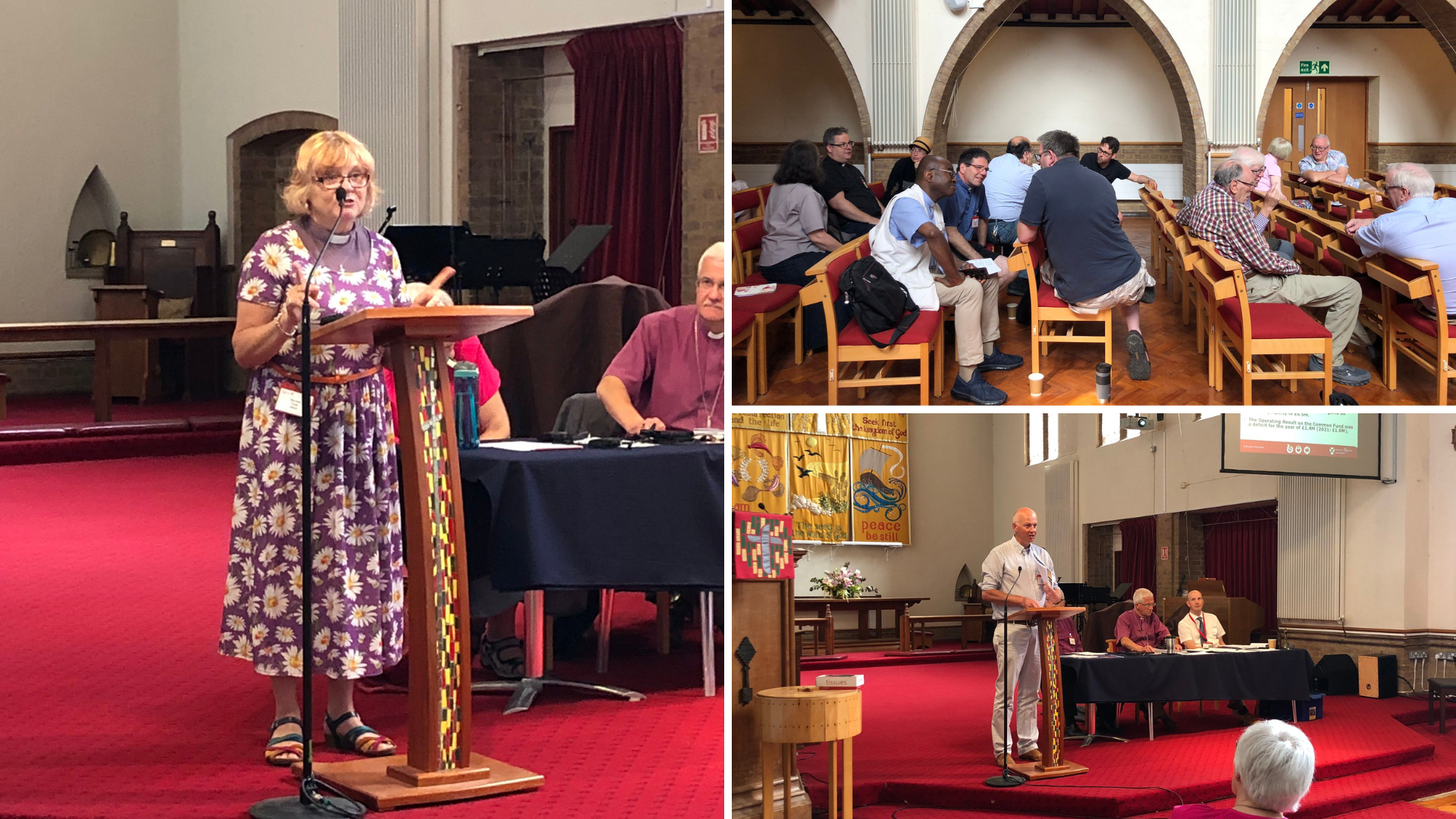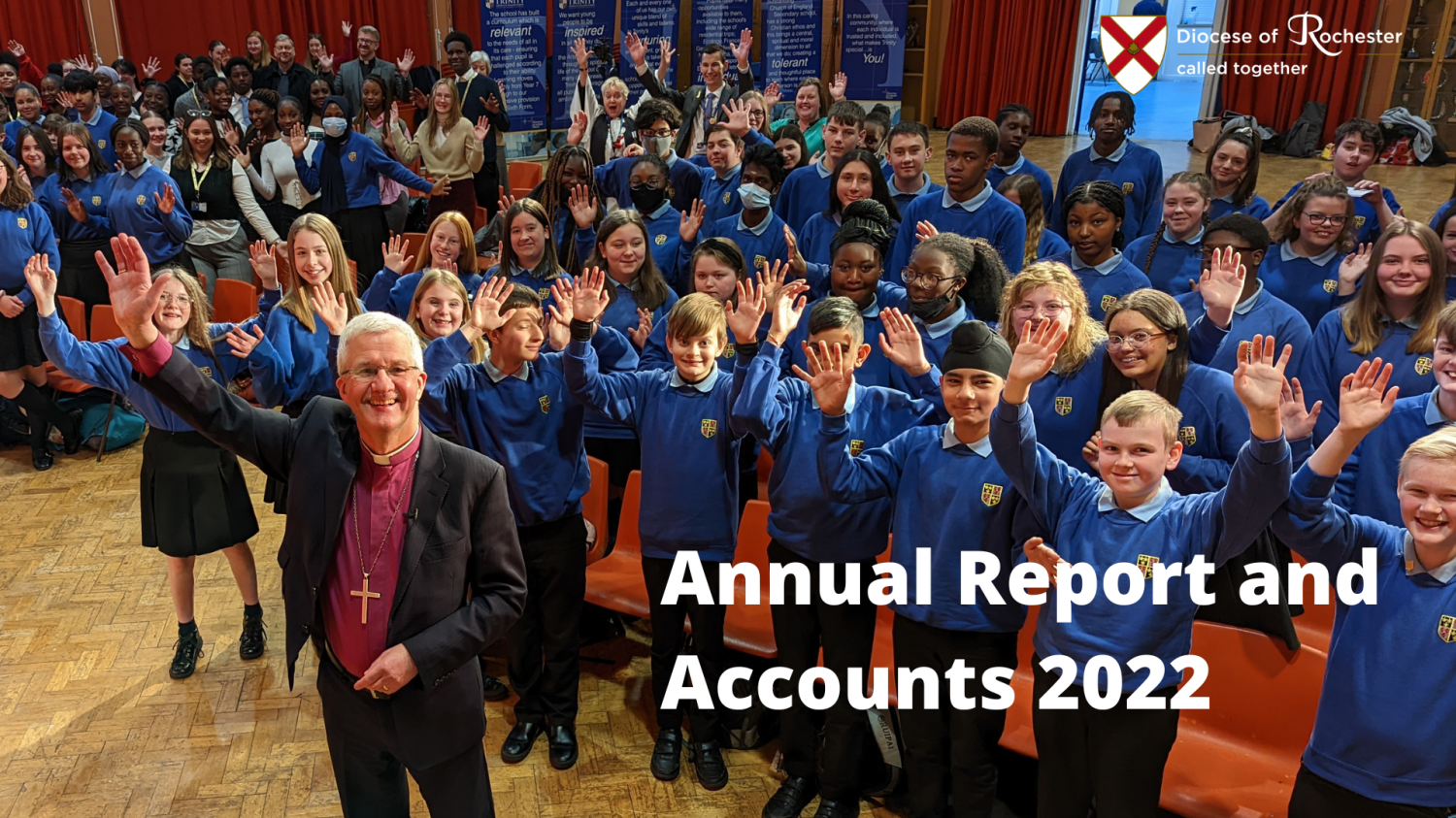
Diocesan Synod – the main policy-making body of the Diocese - met at Christ Church, Orpington on Saturday 24 June.
Items on the agenda included a presentation on the Annual Report and Accounts for 2022, a chance to hear about some of the ‘good news’ coming out of the Archdeaconry of Rochester, and time to reflect on youth vocations.
The Synod opened with worship led by Archdeacon Allie Kerr, the new Archdeacon of Bromley and Bexley, during which Bishop Jonathan Gibbs, Bishop of Rochester, gave his presidential address.
Bishop’s Presidential Address
Taking the opportunity to reflect upon his first year as Diocesan Bishop, Bishop Jonathan spoke about the dedication of clergy and lay people that he has found in every corner of the Diocese.
There has been so much in which to rejoice and for which to be encouraged.
At the same time, he recognised the challenges and opportunities facing the Church and society, challenges that particularly include the cost of living.
"Later in our meeting, we will be asked to think carefully about the financial position of our diocese and the need to address that issue both realistically and generously.
"There will be some tough decisions to be made in the year ahead, and it is vital that we should approach the issues around finance in a spirit of mutual commitment and encouragement."
With these challenges in mind, he said he believed his themes of Change, Serve, Grow, “offer us a framework for addressing many of the huge challenges that our churches are facing in fruitful and productive ways.”
He also referenced the recent decision of the Archbishops’ Council to disassemble the Independent Safeguarding Board, a decision that has nationally caused significant concern among victims and survivors of abuse and their advocates.
Read more about Bishop Jonathan’s address
The need to grow youth vocations
A presentation by the Rev Trudi Oliver, vicar of St Mary, Gravesend picked up on Bishop Jonathan’s comments on the need to develop a younger and more diverse church, as she spoke to Synod about her additional role as the Diocese’s Youth Vocations Champion.
Speaking about the importance of encouraging and enabling young people to hear God’s call, she warned that not engaging with young people on this matter would only store up difficulties for the future.
Although understanding that it can seem overwhelming, she encouraged Synod of the need to grow a cohort of younger and more diverse lay and ordained ministers saying,
“Don't dismiss someone because they are young.”
Trudi offered to visit churches to help them think about how they can support young people in how they hear the call God has for their lives.
Let's plant the seed and grow a culture of vocation.
Synod then spent a fruitful time engaging in conversation and questions about young vocations.
Good news from Rochester Archdeaconry
Up next was Archdeacon Andy Wooding Jones, the Archdeacon of Rochester, who had the opportunity to share some of the good news stories coming out from his Archdeaconry.
Synod has previously heard from Archdeacon Sharon Copestake, the Archdeacon of Tonbridge, and will hear from Archdeacon Allie at their next meeting.
Archdeacon Andy said that each church was doing ‘something amazing’, and so rather than spotlighting specific churches, he wanted to draw out some key themes that are giving him cause to "rejoice".
These included the different connections being made by churches at many different levels, such as with local authorities, who are being very positive about the impact churches are making in their communities.
He's seeing an increase in prayer being used and recognised as the bedrock to support and inform the work of local churches, and he’s been encouraged by the engagement of churches with their communities.
“God is at work, God’s people are at work, and we are seeing signs of God’s Kingdom.”
This might include a warm space initiative that has subsequently become a catalyst for other creative outreach, such as groups that walk together, play board games together, or that embroider.
There is exciting news about buildings too, with three major re-orderings underway that have taken years of careful prayer and planning to make happen.
Andy also shared something of the work of the Kent Workplace Mission, a group that he chairs, and which supports chaplaincies in the workplace.
It's a growing piece of work, with chaplains present in Bluewater Shopping Centre and new town centre chaplains in Tunbridge Wells and Anerley. A new chaplaincy is being developed at the Ashford Outlet centre, as the positive impact of such initiatives on staff and visitors is being recognised.
Annual Report and Accounts
The main body of Diocesan Synod was dedicated to the Annual Report and Accounts for 2022, which were introduced by the Diocesan Secretary, Matthew Girt. He noted that 2022 had been a very full year, with the report giving a good sense of the diversity and breadth of all that is going on.
Synod was encouraged to read the report and to explore the interactive version which is now available online.
Turning to the Diocese’s financial position, he noted that there are two pressures.
The first is that while progress has been made on the Diocese's deficit, which currently stands at around £1.4 million, there has been a drop in Parish Offers of around £1.25 million - the sum of money parishes pay into the Common Fund, which is the common pot of funds used to fund mission and ministry across the Diocese.
Alongside this is a 5% rise in stipends and salaries in 2023, which means a further outlay of approximately £360,000. If this percentage increase was to be repeated in 2024 this is additional expenditure of £700,000.
With inflation currently running at about 8 percent, altogether this could if nothing else was to be done result in a deficit of £2.1 million in 2024.
The Diocesan Board of Finance is digging deep in order to maintain the situation, however, Matthew said that it is crucial that we “all hold this challenge jointly in faith” as we continue to plan for change in 2024.
Following Matthew's introduction, the Chair of the Board of Finance, Nigel Pope went through the figures in more detail, noting like Matthew, the Diocese's 2022 operating deficit of £1.4 million.
Although this is lower than 2021, (which saw a deficit of £1.6million), it was still a very challenging figure.
Nigel expressed gratitude for all those parishes who have continued to meet their Parish Offers or to pay as much as they are able. He said it was sobering to note that in 2022, 114 out of 176 benefices were not able meet their ministry and diocesan support costs for a variety of reasons.
This shows how important the contribution of those who can meet their Parish Offer is, as they are supporting those who are unable to do so at this time and are allowing mission and ministry across the Diocese to be maintained.
Nigel was clear that the financial strategy was not focused on managed decline but on growth.
An example of this is the £9.6 million documented in the accounts, which is available for long-term investment in growing the Kingdom of God in the Diocese. This has been made possible thanks to our adoption of a Total Return approach to our investments.
Total Return is a way for a charity to benefit from the increased value over time of a permanent endowment – such as a gift of money or a legacy – by releasing that increase in value so it can be spent in the present day.
Synod adopted the report and accounts which are available here.
Safeguarding
Synod went on to receive a Safeguarding update from Archdeacon Andy, Bishop’s Lead for Safeguarding.
They officially noted new Lone Working guidance, that has been created to help church officers help reduce risk to themselves and others in lone working situations.
It is expected that this guidance will be more fully communicated in the autumn.
Diocesan Synod meets again in November.
